| Reviews & Columns |
|
Reviews DVD TV on DVD Blu-ray 4K UHD International DVDs In Theaters Reviews by Studio Video Games Features Collector Series DVDs Easter Egg Database Interviews DVD Talk Radio Feature Articles Columns Anime Talk DVD Savant Horror DVDs The M.O.D. Squad Art House HD Talk Silent DVD
|
DVD Talk Forum |
|
|
| Resources |
|
DVD Price Search Customer Service #'s RCE Info Links |
|
Columns
|
|
|
Fallen Idol - Criterion Collection, The
THE MOVIE:
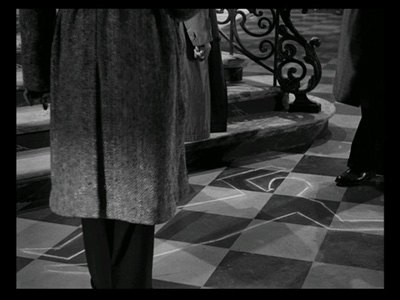
Director Carol Reed and author Graham Greene had several successful collaborations together, including the original work The Third Man and the much later adaptation of Greene's novel Our Man in Havana. Their 1948 film The Fallen Idol is maybe more unique among them for the way it eschews the regular conventions of a crime film and imagines what it would be like to view misdeeds from much smaller eyes.
Actually, to reduce The Fallen Idol to being a movie that is exclusively from a child's point of view would be to do it a disservice. Yes, its particular charm is that its plot ebbs and flows on the whims and dubious interpretive skills of an elementary school boy. Simultaneously, however, Reed and Greene also unlock the door to the rarefied world of a foreign embassy, an existence within regular society and standing apart from it. It's a world where anything can happen because it is beyond the gaze of normal citizens, and the true trouble comes from when a reality where anything is possible butts heads with a child's imagination, another pocket universe where anything can be perceived as possible.
First-time child actor Bobby Henrey plays Phillipe, the son of a foreign ambassador to England. Phillipe's father doesn't take an active role in his care, and his mother has lived away from them for some time. This leaves the fathering to Baines (Ralph Richardson, Richard III), the kindly butler who lives at the embassy. His treatment of the lad couldn't be more opposite from the boy's relationship with Mrs. Baines (Sonia Dresdel), who attempts to run the house with an iron fist. On the weekend over which Fallen Idol takes place, the ambassador is heading home to meet his wife and ferry her over to England. It's an attempt to restore familial order that is coming a little too late.
After Phillipe has a row with Mrs. Baines, he is confined to his room. Only, when he sees Mr. Baines leave for an afternoon walk, the boy sneaks out and follows him. He finds the father figure in a tea shop whispering with a younger woman. Julie (Michèle Morgan, Passage to Marseille) isn't Baines' niece, as he tells Phillipe she is, but of course, they are having an affair. Phillipe has seen it all, but he doesn't understand what it is that he's seen. Ironically, the bigger problem is going to come when he doesn't see something but thinks he knows what happened.
Once Baines has asked the child to be a part of his secret, it creates yet another world for Phillipe to navigate. When Phillipe inadvertently tells Mrs. Baines about her husband's rendezvous, she too asks the boy to keep quiet. If he were an adult and this kind of deception was just another part of his everyday life, then Phillipe might find it easier to juggle, but with so many secrets to keep straight, he no longer has a clear picture of where he's standing.
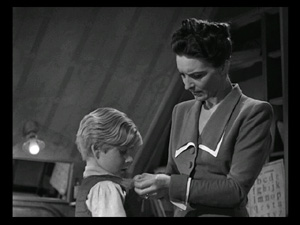
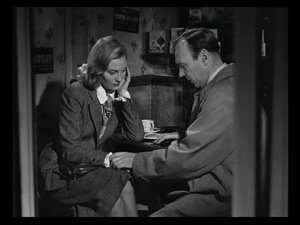
Things seem to be taking a turn for the better when Mrs. Baines goes away for the weekend. Julie comes over for dinner with the men, and they play a game of hide and seek afterwards. The huge house, which already stands alone as a transplanted chunk of foreign soil, becomes their private domain. The secret Baines has led Phillipe into becomes the trio's whole reality. It creates a sense of safety for the child. He is once more in a place that is comfortable.
Except Mrs. Baines has tricked them. She didn't go away at all. She comes crashing into their idyllic existence, and her invasion sends things spiraling out of control. A legitimate accident causes her to fall to her death, but since Phillipe didn't see the action, only the aftermath, he is convinced that murder has taken place. This not only sends him running out into the real world, careening through beautifully lit cobblestone alleyways, but her death acts as an invitation for the real world to muscle its way into what has previously been a private domain. As Baines attempts to cover the elements that will make him look guilty, Phillipe is thrust in over his head. Thinking he is helping, he tries to lead the police away from his friend, but he only pushes them towards Baines. As the butler tries to explain himself, he must also unravel the fictions he has told the boy in an attempt to amuse him. Phillipe sees his hero disintegrate before his eyes. He no longer knows what to believe.
Reed and Greene have put their young protagonist in a situation that is going to test the limits of his innocence. Early in the film, Baines says that a lie isn't so much of a lie if it's intended to be kind. This kind of moral degree is beyond the scope of a child, and Phillipe is out of his depth. Reed teases an excellent performance out of his young charge. The actor's natural precociousness comes to good use when it's time for Phillipe to drive the police batty with his ever-changing story. Up until that point, Henrey is constantly chattering and bobbing around the set. The audience is nearly exasperated with him, as well, so it's easy to believe that the stalwart detectives have lost their patience.
Thematically and stylistically, The Fallen Idol has much in common with Hitchcock's Shadow of a Doubt. In both movies, a young person loses faith in the adult they previously admired because of certain indiscretions they think they've discovered. Reed is being trickier, however, in that he has already informed his audience that Baines is innocent. The tension comes from our fear that it won't matter, that his concerns of how the truth might incriminate him will become the noose around his neck. Ralph Richardson is amazing. As Baines' life sinks deeper and deeper into the morass, his face falls, his body slumps, and his voice loses volume. It's hard not to feel for the old guy. Nothing seems to be going his way.
The Fallen Idol maintains its grip on our nerves right up until the very last shot, where Reed lets both us and his young star off the hook. The finale is one big sigh of relief, a reassurance that the hard lessons Phillipe has learned can be set aside at least for a little while. Maybe he'll eventually understand why Baines did what he did, maybe he won't, but we at least know that life will go on. That's the best thing about a suspense film, the release of the tension, a payoff for the nail biting we have gone through. It's to Carol Reed and Graham Greene's credit that they didn't just go for the shocks, but sculpted characters that feel and breathe and learn, as well. We could get an ulcer from our fear that they might be too badly damaged, but our reward is the hope that the barriers that have segregated them are now gone, leaving them to carry on stronger than before.
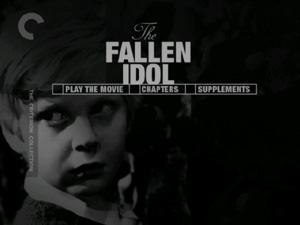
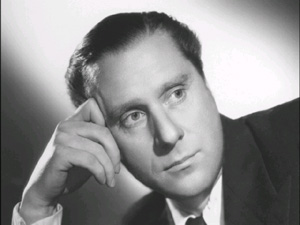
THE DVD
Video:
The Criterion Collection's DVD of The Fallen Idol was mastered in high definition at a 1.33:1 aspect ratio. The black-and-white photography is breathtaking. It looks better here than when I saw a circulating print of the movie in a theatre this past summer.
Sound:
This disc preserves the original monaural audio track. There are also optional English subtitles.
Extras:
Criterion has commissioned a new documentary, A Sense of Carol Reed. Clocking in at around 24 minutes, it features interviews with Reed's friends and collaborators illustrated with scenes from his movies and on-set footage. Film-wise, it focuses mainly on Odd Man Out, The Third Man, Oliver!, and The Fallen Idol. Most of the time is spent on Reed's unobtrusive directing style and how he was able to work so well with children. His special working relationship with Alexander Korda is also given some airtime.
Additionally, the disc has the original press book for The Fallen Idol and an illustrated Carol Reed filmography. It runs through each of Reed's directorial efforts, showing a press image, a poster, or sometimes both.
As usual, Criterion has included a supplementary booklet. For The Fallen Idol, there are three critical essays about the film, ranging from general discussion of the film to one about the process of adapting Greene's short story into a full-length movie.
FINAL THOUGHTS:
The team of writer Graham Greene and director Carol Reed have created a suspense film that wrings its twists and turns from the psychological turmoil its characters go through. The Fallen Idol isn't only about one man's toppling from the pedestal a child has placed him on, but the house of cards that is childhood, of how innocence can only be locked away from the corrupting influence of the real world for so long. It's a fine addition to the Criterion Collection, and in return, the folks over there have added on some keen extras. Highly Recommended.
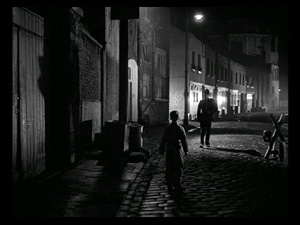
Jamie S. Rich is a novelist and comic book writer. He is best known for his collaborations with Joelle Jones, including the hardboiled crime comic book You Have Killed Me, the challenging romance 12 Reasons Why I Love Her, and the 2007 prose novel Have You Seen the Horizon Lately?, for which Jones did the cover. All three were published by Oni Press. His most recent projects include the futuristic romance A Boy and a Girl with Natalie Nourigat; Archer Coe and the Thousand Natural Shocks, a loopy crime tale drawn by Dan Christensen; and the horror miniseries Madame Frankenstein, a collaboration with Megan Levens. Follow Rich's blog at Confessions123.com.
|
| Popular Reviews |
| Sponsored Links |
|
|
| Sponsored Links |
|
|
| Release List | Reviews | Shop | Newsletter | Forum | DVD Giveaways | Blu-Ray | Advertise |
|
Copyright 2024 DVDTalk.com All Rights Reserved. Legal Info, Privacy Policy, Terms of Use,
Manage Preferences,
Your Privacy Choices | |||||||













